Here is a list of books that have helped and changed not only my career, but also my life.
If there’s a theme to them, it’s that they are less about IT than how people interact with technology, and how an understanding of that can make you and your organisation more efficient.
The Goal
Published in 1984, before Windows 1.0 was released, The Goal is still read by many and recommended by the likes of Jeff Bezos.
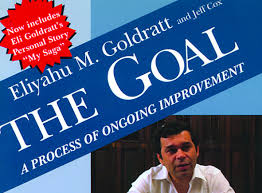
Unusually for a business book, it’s a novel. A manager of a factory that is threatened with closure has three months to turn around its dysfunctional organisation. After going on a bender and having a row with his wife, he sobers up and bumps into an old friend that guides him on how to debug his business. He makes it up with his wife and figures out how to turn things around at work.
Many readers will already be aware of The Phoenix Project, a book popular among the DevOps community. TPP is based on The Goal, and has a similar plot. Personally, I prefer The Goal over The Phoenix Project for a couple of reasons.
First, it’s really well-written. It’s a good enough novel that my wife (a mental health nurse with zero interest in IT) read it and enjoyed it in a couple of sittings.
Second, the fact that it’s not about 21st-century software encourages you to think about your work in terms of systems rather than our specific local terms. Continuous improvement, problems of delivery flow, disaffected staff, and angry spouses have always been with us, and the solutions can be surprisingly similar.
For me, this book emphasised and backed up my instinct that in an imperfect world, the importance of focussing on the biggest problems first and the human factor are vital in improving any delivery environment.
The Checklist Manifesto
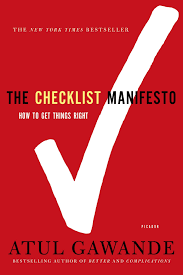
How have different industries dealt with failure?
Atul Gawande is a surgeon and public health researcher who here looks at three fields: medicine, construction, and aviation. All these fields have little tolerance for failure (buildings that fall down, planes that fall out of the sky, and doctors that kill tend to attract headlines and unwanted attention).
What becomes clear is that there is a maturity model for dealing with failure – first a ‘hero’ model is espoused (think of the aviation heroes of early 20th century adventure and wars, or 18th century doctors), and then complexity ensues, reducing the pool of ‘heroes’ to zero. Following that there’s a crisis, and the implementation of simple processes helps manage the chaos. Aviation went from having the ‘fighter ace’ to ‘too much plane to fly’ and moved to a training model using checklists and human-friendly processes. In medicine, simple checklists help reduce error (and the cost of lawsuits). Standard processes along with creativity – applied reliably and when required – helps buildings stay up.
This book stiffened my resolve to improve documentation and process in a growing business, which I wrote about at more length here.
The Practice of Management
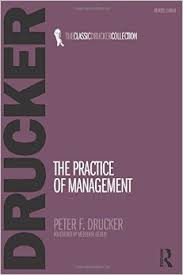
Another oldie, this time from 1954, it discusses businesses of the day and their challenges in a timeless way (aside from the complete absence of the feminine pronoun).
A glance through it will reveal the same concerns we have always had – the section on ‘Automation’ is itself a fascinating historical document, and applies to today just as much as it did 60 years ago. There is a section on the importance of ‘innovation’ that reads like a contemporary call to arms. If you thought Google was the first organisation to try and do without middle management, there’s a chapter headed ‘Ford’s Attempt To Do Without Managers’.
If last century is so last century, then he looks to the Roman army and the Jesuits (‘the oldest elite corps) for how management training has been shown to work.
This book is a great mind-expander for those who need to start thinking about human organisations and their challenges in delivering what we now call ‘value’.
The Art of Business Value
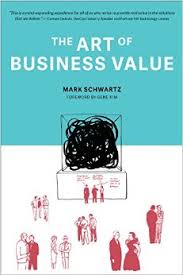
This is more a work of practical philosophy than about business. Mark Schwartz is a CIO working in the field, who here deconstructs some of the lazy assumptions and rhetoric surrounding what has come to be known as capital a ‘Agile’.
Practical and down-to-earth, he first breaks down what ‘business value’ might mean, and shows that there is little clarity about what this often taken-for-granted concept stands for. Other terms get similar treatment: who is the ‘customer’ in agile; is profit and business success the same thing; how granular can the organisation be?
This book gives you the courage to ask simple questions and not take for granted that the messages you’re getting about how to work are based on solid foundations.
I talked about trusting your local knowledge a while back here and wrote the talk up here.
It’s not often you get a book that’s lucid, useful, and quotes French philosophy while making it relevant.
Getting Things Done
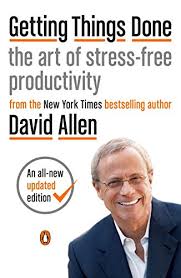
I picked up this book almost by accident in a bookstore while on holiday. I’d read so many stories and references to it on HackerNews I was ready to mock its easy slogans and trite advice.
Damn, was I wrong! This book didn’t so much change my life as turn it upside down. I was a stressed out, time-poor SRE who couldn’t possibly fulfil all his obligations, and using the advice and guidance here I have since transformed my career by writing a book, developing this blog, and moving jobs.
Again, this is less about technology than the human element to improving efficiency.
Its advice was so pragmatic and sensible that I rue the fact that I didn’t read it decades before.
Did I Miss One?
I’m always on the lookout for good and classic works to read and make me think. If I missed any, let me know.
Ad
My book Docker in Practice:

Get 39% off with the code: 39miell
Hey , thank you for sharing this useful content , highly appreciate.
Thanks for that!